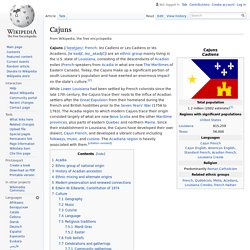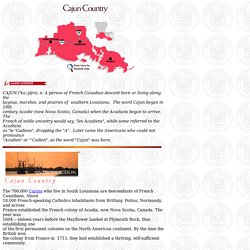

American Cajun Music. Cajuns. Cajuns (/ˈkeɪdʒən/; French: les Cadiens or Les Cadiens or les Acadiens, [le kadjɛ̃, lez‿akadjɛ̃]) are an ethnic group mainly living in the U.S. state of Louisiana, consisting of the descendants of Acadian exiles (French-speakers from Acadia in what are now The Maritimes of Eastern Canada).

Today, the Cajuns make up a significant portion of south Louisiana's population and have exerted an enormous impact on the state's culture.[2] Acadia[edit] Ethnic group of national origin[edit] The Cajuns retain a unique dialect of the French language and numerous other cultural traits that distinguish them as an ethnic group. Cajuns were officially recognized by the U.S. government as a national ethnic group in 1980 per a discrimination lawsuit filed in federal district court.
We conclude that plaintiff is protected by Title VII's ban on national origin discrimination. History of Acadian ancestors[edit] The Acadians were scattered throughout the eastern seaboard. Sociologists Jacques Henry and Carl L. Cajun Folk Songs by Frank Ticheli. Composer's Notes Cajuns are descendants of the Acadians, a group of early French colonists who began settling in Acadia (now Nova Scotia) around 1604.

In 1755 they were driven out by the British, eventually resettling in South Louisiana. Today there are nearly a million French-speaking descendants of the Acadians living in Louisiana and parts of Texas, preserving many of the customs, traditions, stories, and songs of their ancestors. Although a rich Cajun folksong tradition exists, the music has become increasingly commercialized and Americanized throughout the twentieth century, obscuring its original simplicity and directness. In response to this trend, Alan and John Lomax traveled to South Louisiana in 1934 to collect and record numerous Cajun folksongs in the field for the Archive of Folk Music in the Library of Congress. By doing so, they helped to preserve Cajun music in its original form as a pure and powerful expression of Louisiana French Society. Introduction to Cajun, Louisiana Creole & zydeco music.
By Jim Hobbs Cajun, Louisiana Creole & Zydeco Music Search home Who are the Cajuns?

What is Cajun music and where did it come from? The French colonized Canada beginning in 1604, with many settling in what is now Nova Scotia but was then called Acadie. The word Cajun comes from the word Acadian. Few Acadians stayed in the port of arrival, New Orleans. The music these people brought was simple. Alan Lomax described the music of Poitou, the region in France most Acadians came from, as: solo unaccompanied ballads, lyric songs with complex texts, unaccompanied air playing on fiddles and wind instruments, unison group performances of ceremonial songs, and dance orchestras where string and wind duos play tunes in unison or in an accompanying relationship.
The earliest Acadian songs were long ballads originally from France. Cajun music is first and foremost, social music. Musicians wrote original songs telling of their life in the new world. Cajun music was first recorded in New Orleans in 1928. Significant Albums, Artists and Songs. Difference Between Cajun Music and Zydeco?
By Megan Romer Question: What is the difference between Cajun Music and Zydeco?

Answer: Many people, when hearing Louisiana-style music with accordion, simply think "Zydeco! " However, Cajun Music and Zydeco are actually quite different. Cajun History Primer: Let's start with a quick history lesson: the Cajun people of Louisiana left France to settle what is now Nova Scotia. Creole History Primer: The black Creole people have a quite different story. Continue reading below our video Play Video Les Gens Libres du Couleur, or Free Men of Color, were a group of property-owning free Black people. Reading/Research Room. History of Cajun Country. CAJUN ('ka:-j@n), n.

A person of French Canadian descent born or living along the bayous, marshes, and prairies of southern Louisiana. The word Cajun began in 19th century Acadie (now Nova Scotia, Canada) when the Acadians began to arrive. The French of noble ancestry would say, "les Acadiens", while some referred to the Acadians as "le 'Cadiens", dropping the "A". Later came the Americans who could not pronounce "Acadien" or "'Cadien", so the word "Cajun" was born. The 700,000 Cajuns who live in South Louisiana are descendants of French Canadians. For refusing to pledge allegiance to the British crown, which required renouncing their traditional Catholic religion for that of the Anglican Church, they were forced from their homes in 1755. The survivors were scattered along the U.S. eastern seaboard until in 1784, the King of Spain consented to allow them to settle in South Louisiana.